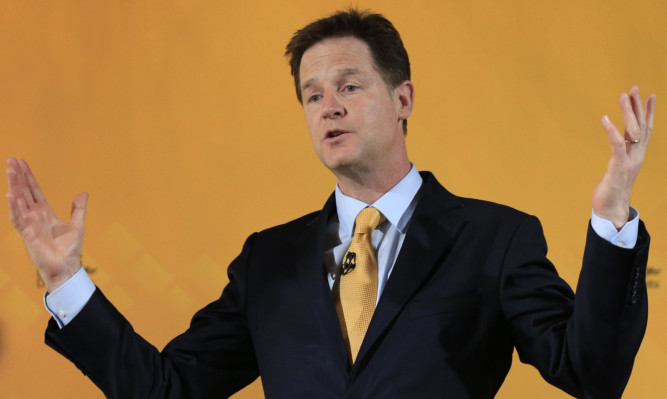
David Cameron or Ed Miliband will have to hold an emergency budget within 50 days of the election agreeing to meet key Liberal Democrat demands if they want a coalition deal, Nick Clegg has said.
His red line would effectively veto the Tory plan to cut £12 billion from the welfare budget as part of efforts to balance the books if the Lib Dems teamed up with the Conservatives again.
If the Lib Dems were in coalition with Labour, the demand would impose a timetable on Ed Miliband and Ed Balls to deal with the deficit.
Mr Clegg would insist on extra tax revenue being raised from the wealthy, although he stopped short of declaring that the introduction of a mansion tax would be a deal breaker in any talks with the Tories.
He said: “Whether we are in government with Labour or the Conservatives, we will pin them down within weeks of the election and force them to put their cards on the table.
“David Cameron, Ed Miliband – the Liberal Democrats won’t let you bluff your way through. We won’t let you risk our economic recovery.
“We will have a stability budget, to take place within 50 days of election day, a pre-condition of any coalition arrangement.
“There will be no deal if there is no stability. No coalition without coming clean with the British people. This too, is a red line.
“But it is also a means to an end. It is a guarantee to the British public that the Government will balance the books, following a clear timetable, and do so fairly.
“Let me tell you what will lie at the heart of it – a commitment to balance the books, in a timely fashion and in a fair way, and a clear commitment to our world-class public services, including the money that our nurseries, schools and colleges need.”
The stability budget will set out detailed tax and welfare plans to balance the cyclically adjusted current budget. Remaining savings from departmental expenditure will be detailed in a Comprehensive Spending Review to be held in autumn 2015.
The Lib Dem leader said there were three “big principles” behind his stability budget: a timetable to “wipe the slate clean” by dealing with the deficit, a rejection of balancing the books “on the backs of the working-age poor”, and ensuring that “those with the broadest shoulder” make an extra contribution through tax.
Mr Clegg said all three main parties had voted in Parliament to deal with the deficit by the end of 2017-18 and “in the absence of any better idea, that is clearly the timetable which we should stick to”.
“The Labour Party now appears to be saying we have got no real plans to do so any time during the course of the next parliament at all,” he added.
“That’s not really good enough, the Labour approach – no timetable, no plan, no detail. You can’t balance the books, let alone do so fairly, unless you have some detail, unless you have a plan, unless you have a timetable.”
Confirming that his party would not sign up to Tory plans to slash £12 billion off the welfare budget, he said: “There is no way we would accept the Conservative plan to take the equivalent of £1,500 away from eight million of the most vulnerable families in this country.”
The Lib Dems have championed a mansion tax, the “banded high-value property levy”, on homes worth more than £2 million – a principle shared by Labour but resisted by the Conservatives.
Mr Clegg appeared to concede that the policy would not be a deal breaker as long as the rich were asked to make some other contribution.
“It’s the principle that counts,” he said, saying that the Lib Dems had identified £5 billion of tax increases as part of the £27 billion consolidation effort needed by 2017-18.
“We have identified £5 billion of tax increases on the wealthiest, partly through the banded high-value property levy, partly through changes in capital gains tax, dividend tax and other measures, to find that £5 billion.
“In the absence of a better plan from anyone else, that’s the plan that we would expect to put in place.”
He added that “if people have other ideas” he had an “open mind” about how to meet the Lib Dems’ aims.
“But the idea that the Liberal Democrats would ever sign up to a deficit reduction plan which penalises the working age poor and doesn’t ask anything of the wealthiest through the tax system, that is inconceivable.”
Mr Clegg’s speech at the National Liberal Club in central London followed the decision to start explicitly setting out the terms the Lib Dems would demand in any deal after May 7.
He has already declared that a commitment to increase the education budget to keep pace with rising prices and the growth in pupil numbers will be a “no ifs, no buts” red line.

Enjoy the convenience of having The Sunday Post delivered as a digital ePaper straight to your smartphone, tablet or computer.
Subscribe for only £5.49 a month and enjoy all the benefits of the printed paper as a digital replica.
Subscribe